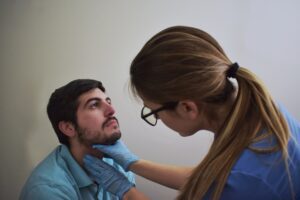
In observance of the holiday season, Advanced OccMed will be closed on the 23rd-27th and the 1st of January.

As international travel becomes increasingly popular, it is essential for travelers to be aware of the potential health risks associated with their destinations. One such risk is yellow fever, a viral disease transmitted by certain species of mosquitoes. In this blog post, we will explore the importance of the yellow fever vaccine for international travelers and the key information you need to know before embarking on your journey.
Yellow fever is a viral illness that primarily occurs in tropical and subtropical regions of Africa and South America. It is transmitted to humans through the bite of infected mosquitoes, particularly the Aedes and Haemagogus species. The virus can cause a wide range of symptoms, from mild flu-like symptoms to severe illness characterized by jaundice, internal bleeding, and organ failure.
The yellow fever vaccine is a safe and effective method of protection against the virus. It is a live attenuated vaccine that stimulates the immune system to produce antibodies, providing immunity against yellow fever. The vaccine is typically administered as a single dose and provides long-lasting protection.
For travelers planning to visit countries with a risk of yellow fever transmission, receiving the yellow fever vaccine is often a requirement for entry. It is crucial to check the vaccination requirements of your destination well in advance and ensure you receive the vaccine at least 10 days before your trip to allow for optimal protection.
Many countries have established legal requirements for yellow fever vaccination to prevent the spread of the disease across borders. These requirements aim to protect both the traveler and the local population. Failure to comply with these regulations can result in denied entry, quarantine, or even mandatory vaccination at the point of entry.
To fulfill these requirements, travelers must obtain an International Certificate of Vaccination or Prophylaxis (ICVP), also known as the “yellow card.” This document serves as proof of yellow fever vaccination and may be requested by immigration authorities when entering or exiting certain countries. It is essential to carry this card with you during your travels.
Receiving the yellow fever vaccine before international travel offers several key benefits. Firstly, it provides personal protection against yellow fever, reducing the risk of contracting the disease and experiencing severe illness. This protection is especially crucial for individuals traveling to areas with a high incidence of yellow fever.
Additionally, getting vaccinated helps prevent the spread of yellow fever from travelers to local populations. By reducing the risk of transmission, travelers can contribute to the overall control and elimination of the disease in endemic regions.
The yellow fever vaccine has a proven safety record. Serious side effects are rare, and most individuals tolerate the vaccine well. However, like any vaccine, it may cause mild side effects such as soreness at the injection site, low-grade fever, or mild flu-like symptoms. These side effects typically resolve on their own within a few days.
It is important to consult with your healthcare provider or a travel medicine specialist to determine if the yellow fever vaccine is suitable for you, especially if you have specific medical conditions or are taking certain medications. They can assess your individual risk factors and provide personalized recommendations.
The yellow fever vaccine is generally recommended for all travelers aged nine months and older who are planning to visit countries with a risk of yellow fever transmission. However, there are some exceptions and precautions to consider.
Pregnant women should consult with their healthcare provider before receiving the vaccine, as the potential risks to the fetus are not yet fully understood. Similarly, individuals with certain medical conditions or compromised immune systems may require special considerations. Your healthcare provider can evaluate your specific situation and advise accordingly.
It is also essential to be aware of any potential interactions between the yellow fever vaccine and other vaccines or medications you may be taking. Inform your healthcare provider about your complete medical history and current medications to ensure appropriate recommendations.
While the yellow fever vaccine provides important protection, it is equally crucial to take additional precautions to prevent mosquito bites. Yellow fever is transmitted by specific mosquito species, primarily during daylight hours. By following these measures, you can minimize your risk of mosquito bites:
As an international traveler, protecting your health should be a top priority. Yellow fever is a significant health risk in certain regions, and receiving the yellow fever vaccine is a crucial step in safeguarding yourself and preventing the spread of the disease. By staying informed about vaccination requirements, consulting with healthcare professionals, and taking preventive measures, you can enjoy your travels while minimizing health risks. Remember to consult with Advanced OccMed or your healthcare provider for personalized advice and vaccination recommendations before your next adventure.
We hope this comprehensive blog post provides you with the necessary information to understand the importance of the yellow fever vaccine for international travel. Safe travels!
Yellow fever is endemic in certain regions of Africa and South America. Countries with a risk of yellow fever transmission include Brazil, Nigeria, Peru, Colombia, Angola, and the Democratic Republic of the Congo, among others.
The yellow fever vaccine is required for entry into certain countries with a risk of yellow fever transmission. It is essential to check the vaccination requirements of your destination and consult with a healthcare provider or travel medicine specialist to determine if the vaccine is recommended for your specific travel plans.
It is recommended to receive the yellow fever vaccine at least 10 days before your trip to ensure optimal protection. This allows sufficient time for the vaccine to take effect and for you to obtain the necessary documentation, such as the International Certificate of Vaccination or Prophylaxis (ICVP).
The yellow fever vaccine is generally safe, but like any vaccine, it may cause mild side effects. These can include soreness at the injection site, low-grade fever, or mild flu-like symptoms. Serious side effects are rare. Consult with your healthcare provider for more information.
Pregnant women should consult with their healthcare provider before receiving the yellow fever vaccine. While the vaccine is generally not recommended during pregnancy, individual circumstances may vary, and a healthcare provider can provide personalized advice.
The yellow fever vaccine is available at travel clinics, healthcare facilities specializing in travel medicine, and some public health centers. Contact Advanced OccMed or a local travel clinic to inquire about availability and schedule an appointment.




